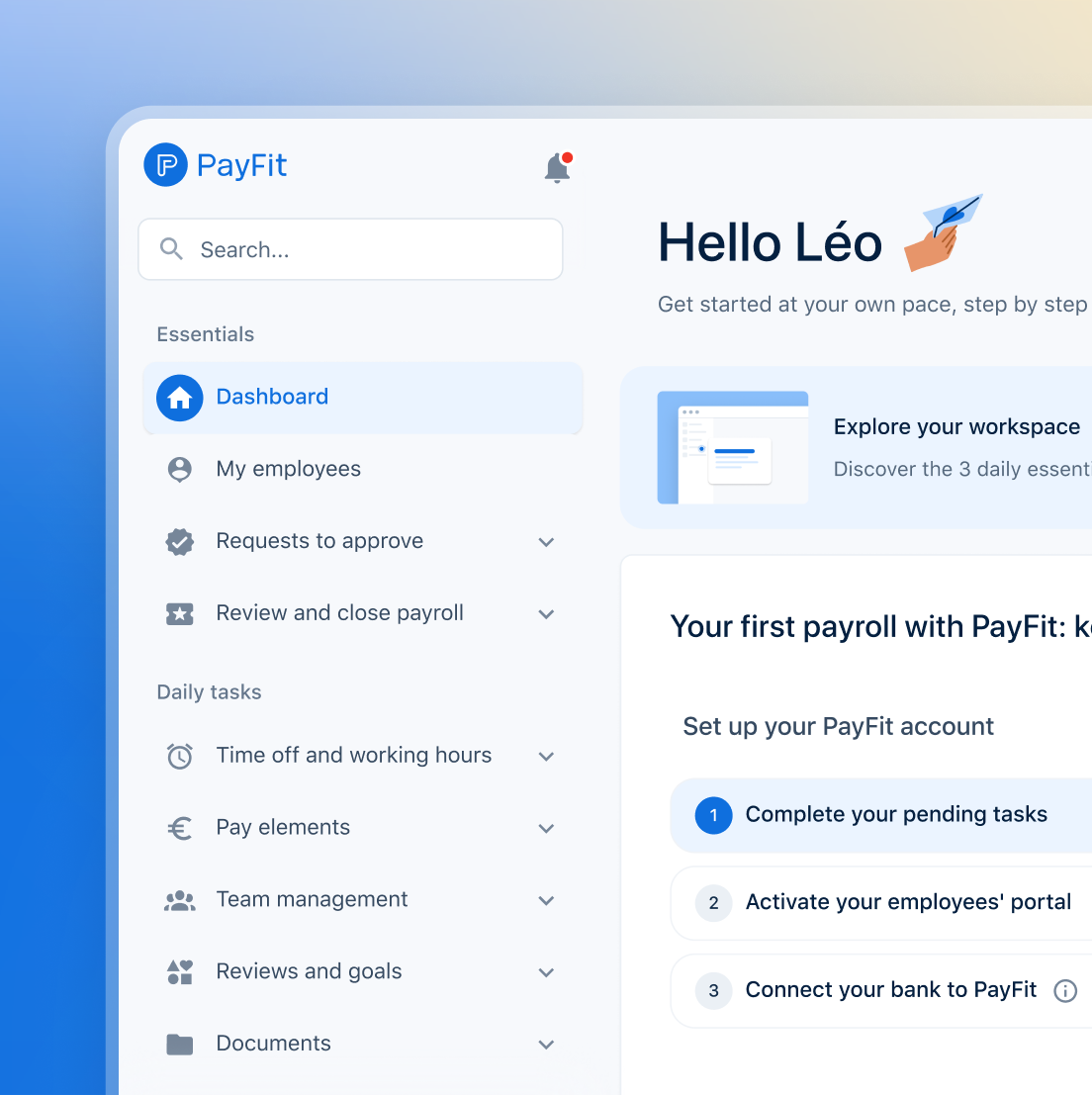✨ Health insurance, now in PayFit - learn more
💷 All the rates & thresholds you need to know for 25/26...right here
✨ The Payroll Journey: Start, Scale & Succeed Globally - learn more
✨ Health insurance, now in PayFit - learn more
💷 All the rates & thresholds you need to know for 25/26...right here
✨ The Payroll Journey: Start, Scale & Succeed Globally - learn more

While many companies may be furloughing and making staff redundant, others are still looking to hire. We sat down with recruitment specialists Tempo, to discuss how to successfully welcome new starters to a company when in full-scale remote work.
Coronavirus has redefined the way that we work. Instead of spending time at our desks, we’re spending time at our living room tables, on our sofas and, if we’re feeling really cheeky, maybe even in our beds!
While our working environment may have changed perhaps forever, companies are having to make adjustments to the way that they recruit and welcome new starters.
This is a subject that’s certainly close to Ben Chatfield’s heart. As the co-founder and CEO of Tempo, he has seen clear trends in the way that companies are running their onboarding operations.
In his opinion, startups have shown to be the most agile and able to react to the current situation.
It’s this willingness to adapt and alter processes that has allowed startups to continue to seamlessly onboard new starters.
But how can it be done?
In this piece, we will provide you with eight tips on how to create the dream onboarding experience.
Onboarding doesn’t just last one week—in fact, it doesn’t even last two!
Instead, onboarding should be seen as an ongoing process, particularly when teams and new starters are operating at a distance.
For us at PayFit, the onboarding process begins a long time before an employee’s first day. The “pre-boarding” process, as we call it, is the period between a candidate accepting a job offer and their first day at work.
This is a crucial time as it allows us to collect all the necessary information we require from the new recruit.
We believe that gathering personal information in advance—address details, date of birth (DoB) and bank details—is a good way of reinforcing trust and ensuring that the new recruit has one less thing to worry about on their first day.
While the coronavirus lockdown hasn’t really affected this part of the process, when it comes to ensuring that the new recruit has all of the equipment they require, we—like a lot of other companies—have faced significant logistical challenges.
However, to help onboard our new employees, we have managed to find a way to personally deliver all equipment while (obviously) respecting social distancing regulations.
Each new starter has had their laptop and their “welcome pack” including a company jumper, an employee book and notebook delivered to their address.

Okay, we understand that in the current climate the first day at work is unlikely to be, well, at work!
Nevertheless, it’s important to ensure that any new starter is welcomed properly.
To help ensure that things get off to a good start, a new starter will receive a call from their manager at around 9 AM. During the call, they will receive support with setting up their computer and accessing their emails.
They will also find in their inbox a welcoming message with a link to all the key applications required for the initial few days. This includes apps such as Slack, Notion and Zoom.
As we are currently all operating 100% remotely, the onboarding calendar should be jam-packed with fun and exciting interactions; however, it is vital to make sure that the week is not too overwhelming.
Under normal circumstances, a new starter in a company may be able to benefit from informal chats over a coffee. These would unlikely be placed in someone’s calendar and would almost certainly be spontaneous.
With remote work in place, it is obviously impossible to have these relaxed and convivial moments. Therefore, it is a good idea to organise and formalise these in the new starter’s calendar.
Not only do these conversations act as important ice breakers, but they also help a new starter to understand who is responsible for what and allows them to feel more comfortable in approaching them in the future.

One of the critical elements in our regular onboarding process is the assignment of a buddy. A buddy's role is to accompany a new starter in their first few days at work and to make sure that they feel at ease and are acclimatising to their new role.
While managers are there to help with the majority of the onboarding process, a buddy can act as a go-between and be a point of contact for any personal issues that the new starter may not feel comfortable talking to their manager about.
To ensure that the relationship works well, a buddy will typically be around the same age and/or level of seniority as the new starter. Ideally, they'll also share a few similar interests too!
Typically, when working in the office together, the buddy will provide advice regarding the facilities, shops and restaurants within the vicinity of the office.
While remote work may have put a halt to this part of the role, the buddy still has an important part to play when it comes to making sure that the new starter is fitting in well.
Organising regular video chats or grabbing e-coffees can be an excellent way of just making sure that everything is going smoothly and ensuring that the new starter has everything they need at their disposal.
One important element to consider with remote onboarding is the amount of time spent on video calls and virtual meetings.
While it is good to try and get everyone up to scratch early on, it’s important to remember that even the most eager of new starters will likely have a breaking point.
The goal is certainly not to reach that.
Video calls can be exhausting and it can be difficult for new starters to demonstrate that they are busy and engaged.
It’s also important to take into consideration each new starter’s individual traits. For some, remote onboarding may be ideal; for others, it may be a challenge and will take some getting used to.
Checking in regularly with your new starter is a good way of ensuring that everything is running smoothly and that they are not feeling too overwhelmed.
Remember, variety is the spice of life, so the onboarding process should be malleable and be ready to adapt to different people and situations.
When starting a new job, the first few experiences and interactions play a significant role in shaping a new starter’s understanding of the company.
During lockdown, these moments may not be as regular as they would otherwise normally be which means it can be difficult for someone to gauge exactly what the company is about.
At PayFit, we’re proud of our values and what we stand for. So when a new starter joins, it is crucial that they understand the way the company operates, what we expect from them and, perhaps most importantly, what they can expect from us.
This is why we provide all new starters with a copy of the PayFit Book—essentially our workplace “Bible”.
During lockdown, we have assigned time in a new starter’s calendar for them to read through the PayFit book during their first week.
The book offers insight, advice and provides a history of the organisation allowing new employees to quickly gain an understanding of what the company stands for.
Care for each other
Strive for excellence
Always stay humble
Live and work with passion
Okay, so we’ve spent a lot of time discussing the niceties of meeting new colleagues and understanding company culture and values.
However, as a global company, every new starter must understand the company's overall global mission.
Nearly half of new employees don’t understand their company’s mission and values after 90 days.
In times of remote work, it is very easy to fall into a little bubble and become oblivious to what is going on outside of a particular department.
This is why we believe that it is vital to organise a weekly global team meeting to allow all new starters to be formally presented to the global team. It also provides an opportunity for new starters to gain an understanding of what the company-wide issues are.
When this is all over, it is absolutely crucial that all those who were onboarded remotely receive a proper face-to-face welcome.
While the now not-so-new-starters may have been at the company for a period of time, it is important that they are greeted in the office as if it were their first day.
After all, having worked remotely up until that point, there will be a few nerves come the first physical day in the office.
At PayFit, the physical onboarding consists of a welcome breakfast with the whole team, a lunch with the new starter's department and usually after-work drinks one day during the first week.
The new starter’s buddy would also be able to resume more conventional duties—e.g. showing them around the local area, the office facilities—and could begin the process of checking in with physical meetings every so often.
PayFit is a payroll software that helps companies to automate and simplify their payroll processes. Interested in finding out more? Why not book a demo with one of our product specialists?


Learn what an employee performance evaluation is, what to include, how to run effective reviews, and how to turn feedback into real improvement.

Corporate wellbeing programmes can support employee health, reduce stress and improve engagement. Learn what to include, how to launch, and which initiatives work best.

2026 strategic guide for UK finance and HR leaders on running effective employment engagement surveys, with top questions, methods & software solutions.

Employee performance management tools streamline reviews, goal tracking and feedback. Discover features, benefits and top UK options for small businesses.

Read our guide to performance appraisals, from their definition and purpose through to best practices and available tools for UK companies.

Employee Assistance Programmes can be a valuable tool for HR leaders to provide support and advice for employees. Find out about them here.

See what's new in PayFit
New features to save you time and give you back control. Watch now to see what's possible